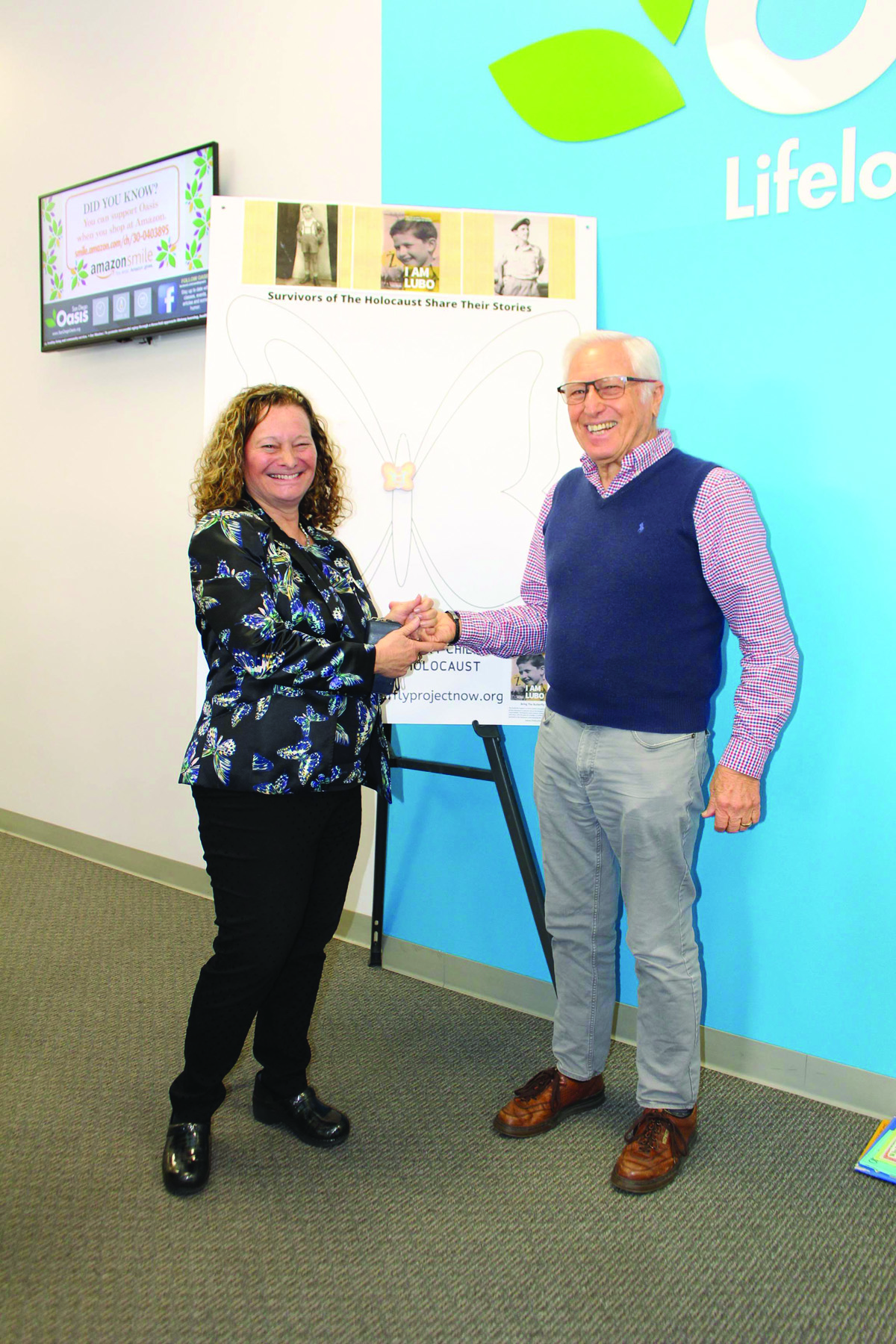Author Lou Pechi, who survived the Holocaust by passing as a Catholic along with his family, patted his chest to indicate the Judaism tucked inside.
“I have my religion here,” Pechi said.
His presentation was part of a larger event that included Pechi speaking from firsthand experience as a Holocaust survivor, followed by a ceramic butterfly painting session led by Butterfly Project director Cheryl Rattner Price.
Price explained that the Butterfly Project is an ongoing project she co-founded with educator Jan Landau which seeks to collectively reach a goal of 1.5 million painted butterflies in honor of the children who died in the Holocaust. The butterflies are permanently displayed in locations around the world.
About 100 people silently listened as Pechi told his life story at Oasis in La Mesa on Sunday afternoon.
Young children sat in the front row of the presentation room, listening attentively to Pechi’s presentation as he kept his story light and interlaced a potentially serious presentation with funny childhood memories.
“I feel like a time traveler. I may look like an 84-year old man but inside I am a seven-year old boy,” Pechi said.
Weaving his story from a combination of carefully preserved photographs projected onto the large screen in the presentation room and short anecdotes of his boyhood survival, the author energetically moved about the stage. He intermittently read passages from his book, I Am Lubo, describing his family’s escape from Croatia to Italy where they lasted out the war as supposed Catholics.
Pechi painted a complex picture of World War II Europe and repeatedly described his mother as resourceful, down to the fact that she and his father deliberately converted to Catholicism ten minutes before he too was baptized, the ritual specifically performed in that order so that Pechi’s baptismal certificate stated he was born to Catholic parents, his family’s Judaism effectively hidden from society.
He said that the world was complicated in those days and sparked laughter throughout the audience with his description of a mean German governess who insisted on good manners and a good spanking if he did not behave, but also taught him proper German.
To nervous laughter in the room, Pechi described a time he proudly showed off a toy gun to the amusement of German soldiers who then let him hold their real weapons, related how his mother kept the family’s savings sewn into the lining of her elegant fur coat, described the sound of his father’s footsteps echoing with the weight of gold coins hidden in the thick soles of his shoes.
Pechi projected a picture of a yellow, circular pin marked with the letter ‘Ž‘ on the screen for all, explaining that it was the Croatian letter indicating the first letter of ‘Jew’, then pulled out a two-inch pin and walked over to the children in the audience, illustrating how simple it was to isolate one child out of a group.
“What do you think the Germans did when they came first thing to the Jews? Registered them… marked them. What happens if I mark this young child?” Pechi asked.
The room fell silent as he said the Germans added insult to injury by requiring Jews to purchase their own pins to mark themselves as outsiders.
However, he also said it was a German lady who helped get him safely out of Brod and across the Italian border to Treviso, where he was absorbed into an Italian school as a Catholic first-grader.
He was arrested one time when he was in first grade, he said, as a possible Jew. The Chief of Police took him into a room, talked with him, then announced he would be leaving the room. He ordered Pechi to count to ten, then calmly walk out of the room and return home. Pechi laughed at the memory and said he ran as fast as he could, terrified.
Only later in life did he realize that the police Chief likely knew he was a hidden Jew and spared his life.
“He endangered his life to release me,” Pechi said.
Pechi wrapped up his story by briefly discussing his move to Israel in 1948 where he learned Spanish, Hebrew and Yiddish to add to his Croatian, German and English. He described how his life looked after a stint in the Israeli Air Force and a final move to San Diego in 1955.
“I never lost my Jewish identification. I always knew I was a Jew,” Pechi said.
He advised the listeners to observe the differences among people but seek out similarities, then turned the room to Price for the second half of the event.
Many of the listeners who turned up for Pechi’s presentation shifted from the large lecture hall to the art studio at the Oasis center, where ceramic butterflies provided by Ceramicafe lay waiting on plates alongside index cards printed with the name of a child who perished in the Holocaust.
Before participants began painting, Price asked everyone to take a moment and read the name of the child on their card, speaking their name aloud to keep their memory alive.
Oasis President and CEO Simona Valanciute said it is events like this that keep the center vibrant.
According to Valanciute, the non-profit organization aims to promote successful aging, a goal she says is accomplished in part by connecting their 48,000 members as tutors with local Title I schools across San Diego county.
As Valanciute and Price circulated through the facility, the chatter of participants could be heard from down the hallway in the art center, butterflies coming to life with vibrant paint while Pechi lingered in the Oasis lobby to answer questions.
“We’re reframing a tragedy to make the world a better place,” Price said.














